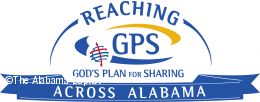Everyone should be doing it. Evangelism, that is.
Lyle Dorsett, Billy Graham professor of evangelism at Beeson Divinity School at Samford University in Birmingham, said Christians need to stop relying on evangelists and pastors to do evangelism.
“We need to pray for workers, ordinary Christians, who go out and talk to people around them. Listen (to them), serve them and tell them about Jesus,” Dorsett said.
After all, telling others about Jesus is the reason God leaves us here after we are saved, explained Roy Hill, pastor of First Baptist Church, Satsuma.
“We need to be sharing the gospel with people; we need to answer that call,” he said.
“Anybody can do it and everybody should do it.”
Dorsett said he knows the harvest is ready in Alabama because he doesn’t see a crowd on the road when he goes to church on Sunday.
In fact, more than 2 million people in Alabama are considered unchurched or unreached, according to research collected by the Alabama Baptist State Board of Missions (SBOM).
“Alabama is a missions field,” SBOM Executive Director Rick Lance wrote to pastors and churches in the Reaching Across Alabama 2012 preparation guide.
Reaching Across Alabama is the next emphasis of God’s Plan for Sharing (GPS) — a “strategic effort on the part of Southern Baptists and Alabama Baptists to reach North America, specifically Alabama, with the gospel,” Lance noted. A 10-year initiative, GPS covers the decade of 2010 to 2020.
“For the Baptist family, it is a decade to make a difference,” Lance said.
But what exactly is GPS, and what does it mean for associations and churches in Alabama? Why does Alabama need GPS?
According to the GPS pastor/church preparation guide, GPS is meant to “fulfill the Great Commission in North America through every believer sharing, every person hearing by 2020.”
In order to accomplish “every believer sharing” and “every person hearing,” churches can participate in a two-part process:
• Churches intentionally align evangelism ministries and efforts by praying for lost people, equipping every believer to share, sowing the Word to every lost person and harvesting the results and celebrating every salvation response.
• Churches participate in evangelism campaigns every even year. The 2012 campaign is Reaching Across Alabama with attractional events during March and April (see story this page).
In the Reaching Across Alabama training DVD, Sammy Gilbreath, director of the SBOM office of evangelism, shares some startling statistics:
• Nearly 25 percent of Alabama Baptist churches baptized no one in 2010.
• More than 1,200 Alabama Baptist churches did no Annual Church Profile for the SBOM.
• Nine out of 10 Christians lead no one to Christ in their lifetime.
Gilbreath emphasizes the need for training in Alabama.
Directors of missions and pastors must be ready to train churches to share the gospel, build contact lists and get to know individual church communities, he said.
Every association and church will be supplied with the GPS preparation guide, a training DVD and His Heart, Our Hands: A Ministry Evangelism Toolkit, a North American Mission Board (NAMB) resource with practical start-to-finish instructions on ministries for individual churches and a video with testimonies and a panel discussion.
Gilbreath also urges Alabama Baptists to know their partners and work together with associational leadership, the SBOM and NAMB.
Phil Winningham, an associate in the SBOM office of evangelism, said there is one word that Alabama Baptists need to focus on in the coming years: intentional.
“[Reaching the entire state] is not just going to happen,” Winningham said.
To be intentional, churches must specifically plan for their areas.
“Evangelism in Alabama is as different as the (more than) 3,200 Alabama (Baptist) churches,” Gilbreath said. “Churches have individual needs.”
NAMB and the SBOM are committed to helping each church find its strengths, passions and needs and cultivate strategies through GPS to reach its area, he said. But in order for them to do that, the church must send in an accurate Annual Church Profile each year.
The reports enable strategies to be built in such a way as to come alongside a church through the Cooperative Program, Gilbreath said.
Winningham pointed out that reporting is biblical.
“(In the Bible), the reason the shepherd knew the one sheep was missing was because he counted them. In Acts 2, we know 3,000 were saved because they counted them,” he noted.
Lance encourages all churches to consider and pray through participating in Reaching Across Alabama. “I look forward to experiencing what our Lord is going to do in the GPS strategy and especially with Reaching Across Alabama,” he said. “He is still God! People are still lost without Christ! The Great Commission is still our mission! GPS is a needed strategy for the coming days. Pray that we all will be found faithful.”
For more information, visit www.gps2020.net.






Share with others: